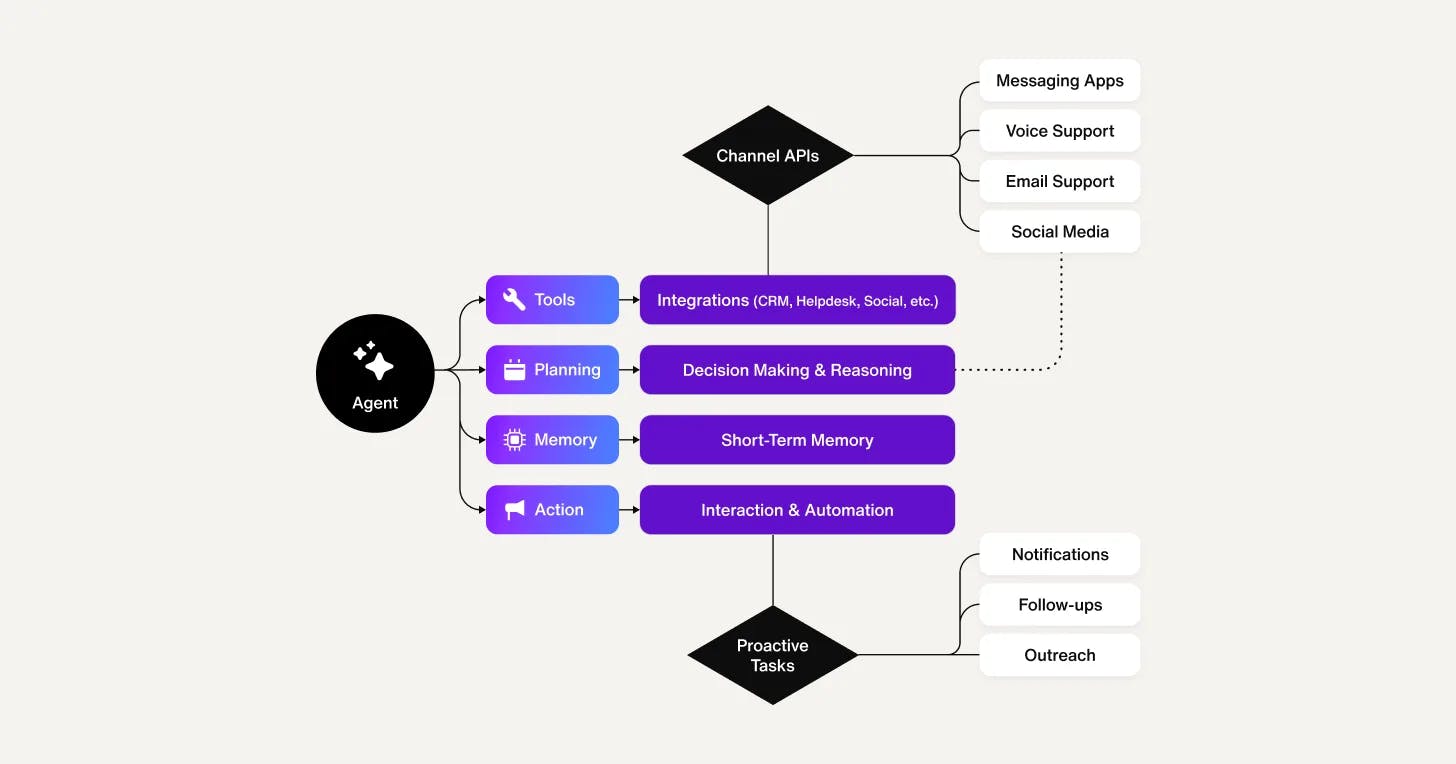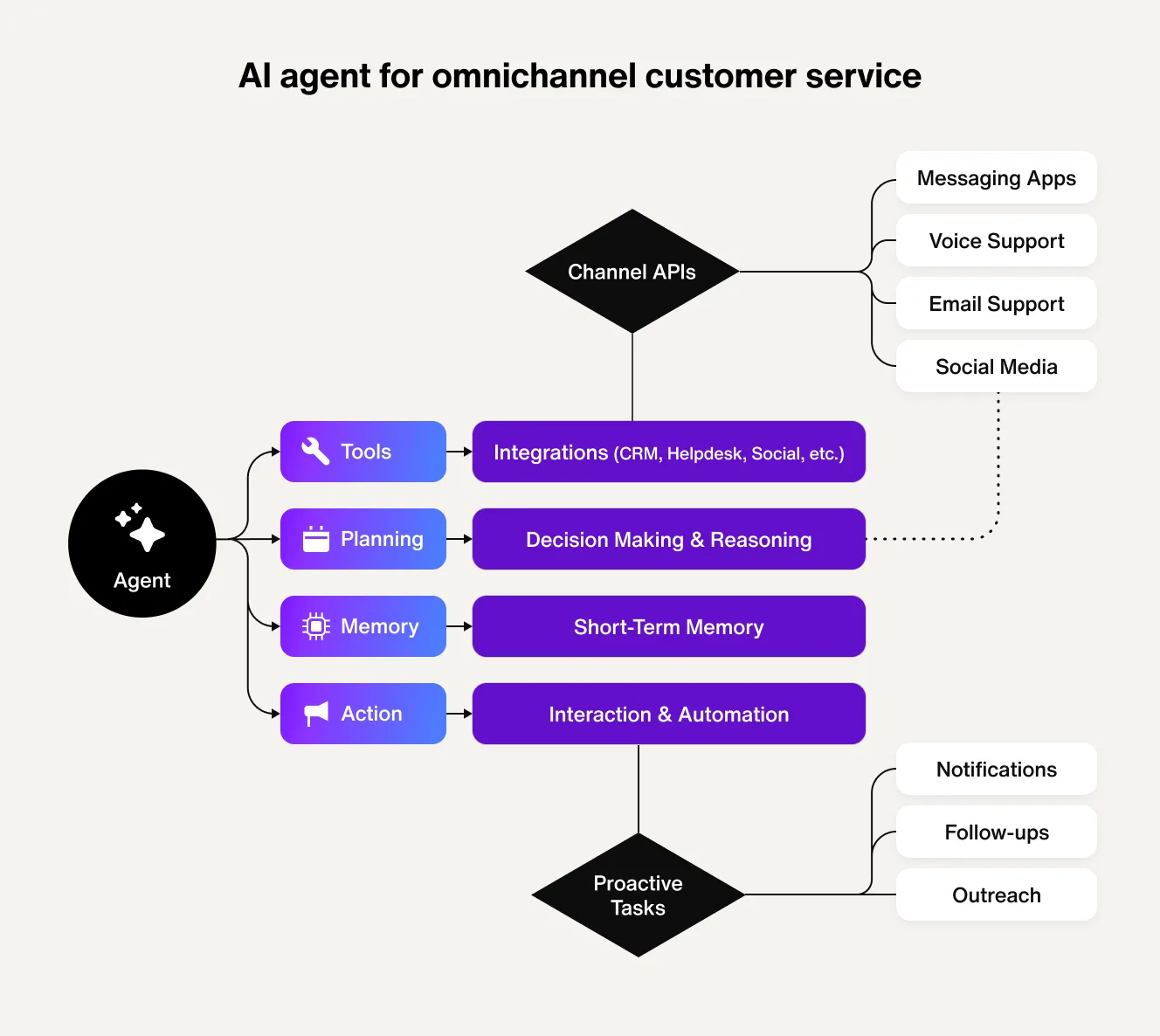How agentic AI improves omnichannel customer service

Omnichannel customer service—which aims to deliver one seamless, continuous experience across all channels—has become the gold standard in recent years. Today, 73% of customers switch between at least three channels in their journey, while 80% say the experience matters as much as the product itself. However, only 45% say they’re “satisfied” with the quality of support they receive.
To meet rising customer expectations, companies are turning to AI-driven solutions to boost both satisfaction and operational efficiency. But despite the shift from rule-based automation to predictive analytics to generative AI in recent years, a true omnichannel experience remains out of reach for most.
Even as generative AI chatbots become table stakes, service operations still struggle with fragmented systems, lack of real-time context, and scalability challenges. And so, the vision of a seamless, unified customer experience remains just that: a vision.
Agentic AI changes this. AI agents are autonomous systems that reason, make decisions, execute tasks proactively—but also integrate seamlessly across business systems to leverage big data at scale.
More than just the next generation of chatbots, AI agents act as the bridge between formerly siloed channels and systems—enabling a cohesive, personalized, and seamless experience across channels that’s both more satisfying for customers and highly scalable for businesses.

Automate customer service with AI agents
How agentic AI enables omnichannel customer service
Agentic AI in omnichannel customer service can automate tasks, personalize interactions, and improve efficiency by proactively addressing issues, tailoring interactions, and seamlessly managing customer journeys across multiple channels. This helps to reduce human workloads, improve customer sentiment, and enhance customer experience (CX) to improve retention.
Unlike generative AI tools that only produce content when prompted, AI agents act independently, interact with various systems, even learn from experience—all in pursuit of the goals set for them. AI agents can also integrate seamlessly with backend systems, tools, and even outside data sources in real time to solve problems.
By using and updating customer information across systems in real time, AI agents can automate multi-step workflows that require live data and deliver hyper-personalized support across channels. This helps support teams to scale fast high-quality care that improves customer satisfaction with far less manual effort.
In short, agentic AI isn’t just helping on one channel, it’s orchestrating support across all channels in real time—preserving context, personalizing experiences, and optimizing outcomes. With its modular architecture, it can operate as one big shared AI brain that runs between all channels and systems, unifying all data and interactions into one seamless, delightful customer experience.

Benefits of agentic AI in omnichannel customer service
Integrating agentic AI into customer service operations allows businesses to provide seamless, personalized, and consistent customer experiences across channels 24/7—elevating customer satisfaction and loyalty at scale—without adding to headcount.
The major benefits of agentic AI for omnichannel customer service agents include:
🔌 Seamless channel integration
Agentic AI interoperates across all business systems and data sources—CRMs, helpdesk software, social, apps, voice—ensuring seamless transitions for a faster, more convenient, and more satisfying experience.
💅 Personalized interactions at scale
AI agents independently analyze customer history, preferences, and behavior to deliver tailored responses and recommendations in real time, making customer care feel more meaningful at scale to improve customer satisfaction and retention.
🏄 Streamlined customer experience
By understanding and tracking individual customers’ needs, preferences, and conversations across channels, omnichannel AI concierges offer consistent, proactive service that’s seamless across channels, leading to improved customer satisfaction and retention.
📈 Efficiency and scalability
By automating routine tasks and improving workflows, agentic AI reduces both human workload and errors. This frees human reps to focus on high value tasks, helping to reduce turnover and create a more consistent quality of customer service at scale.
🌈 Unified customer data
AI agents analyze and compile all interaction data into one unified profile that improves the quality of customer insights. This real time analysis and visibility leads to better decision-making and performance for support teams, while enabling AI agents to self-improve over time.

Leverage omnichannel AI for customer support
Examples of agentic AI in omnichannel customer service
AI agents are already helping CS teams streamline operations, improve customer sentiment, and reduce costs by creating a cohesive customer experience. In fact, agentic AI was recently named Gartner’s top strategic technology trend for 2025.
Here are some common use cases with examples of how AI agent platforms are helping to improve omnichannel service operations:
Proactive issue resolution
By monitoring customer data and connected systems, AI can trigger proactive interventions to address issues before they escalate to ticketed issues—handling an estimated 80% of interactions at first contact (FCR).
Example: An AI agent detects repeated failed login attempts and proactively reaches out to the customer to assist with password recovery before frustration sets in, helping to reduce ticket volume and boost customer satisfaction.
Dynamic personalization
By analyzing both historical data and real-time context, AI agents can dynamically personalize each customer interaction. This creates a sense of individualized care at scale, enhancing customer satisfaction and loyalty.
Example: An AI agent in an ecommerce setting can suggest products or solutions based on both past interactions and current conversational context—as well as external data like seasonal trend reports—to tailor experiences to each customers’ exact needs.
Workflow optimization
AI agents can work autonomously or collaboratively with human agents to streamline operations. They can automate repetitive tasks or act as virtual assistants, embedded in human workflows to improve the speed, accuracy, and outcomes of support processes.
Example: Acting as copilots, AI agents can summarize conversations, suggest responses, surface relevant knowledge articles, and provide ongoing training to improve the performance and efficiency of human agents.
Continuous conversations
By storing and analyzing past interactions in their memory, AI customer service agents can pick up exactly where they previously left off. These smooth transitions enable a more consistent and convenient experience to improve customer satisfaction and retention.
Example: AI agents can start a conversation on one channel (like chat), continue on another (like email), then seamlessly make a hand off to a human agent if needed—eliminating the need for customers to re-enter information—especially helpful in B2B customer service.

Leverage omnichannel AI for customer support
Building agentic AI omnichannel infrastructure
Agentic AI is a complementary technology that works in tandem with existing software, systems, and AI technologies.
If you’re considering the deployment of agentic AI for omnichannel customer service, it’s important to think about a few key components, all of which work together to create a scalable, secure, effective AI infrastructure:
1. Agentic AI engine
The intelligent core responsible for autonomous actions, conversational intelligence, proactive customer engagements, and decision-making across channels. It can be custom built or is available from an AI agent platform.
2. Omnichannel communication layer
Enables seamless integration of multiple customer channels—SMS, chat, in-app, voice, email, social media, WhatsApp, etc.—through robust and scalable enterprise-grade communication APIs.
3. Personalization layer
With access to large language models (LLMs), AI agents can dynamically summarize customer service interactions, auto-generate personalized responses, and anticipate next-best actions based on behavioral signals.
4. Data integration and management
AI agents need access to clean, comprehensive customer data to operate effectively. This layer includes a customer data platform and scalable cloud infrastructure to enable real-time data synchronization across channels.
5. Automation and workflow orchestration
This requires intelligent automation, workflow management, and event-driven AI orchestration so the AI agent can automate tasks and coordinate workflows seamlessly across channels. Recent innovations like Model Context Protocol (MCP) facilitate this.
6. Human-AI collaboration layer
Human intervention is required for ticket escalation, but regular oversight is also needed to ensure the accuracy, efficiency, and quality of AI agent systems. This includes a human-in-the-loop (HITL) system to regularly correct, train, and improve AI outcomes.
7. Analytics and feedback
Use insights to continuously improve AI and omnichannel customer service strategies, leveraging advanced analytics and KPIs to refine AI models and their outputs to enable the best possible customer experience.
8. AI governance and compliance
For all its benefits, AI isn’t without its risks. It’s important to take proactive measures to ensure the responsible, secure, and compliant operation of AI across customer service channels in areas like data privacy and security, AI transparency and explainability, ethical AI, and AI compliance.

Anywhere, anytime AI customer support
Scaling the omnichannel advantage with AI agents
For the 80% of organizations that expect to compete with each other based on CX, agentic AI doesn’t just help to meet today’s support challenges—it positions them to thrive in the experience-driven landscape of tomorrow.
By providing the connective tissue that links conversations, automates resolution, and scales service without sacrificing quality, agentic AI for customer service enables a future where customer support feels more natural, intuitive, and efficient for customers while being more cost-effective and efficient for businesses.
Built on a foundation of enterprise-grade infrastructure, Delight AI concierges deliver effortless customer support across every channel. Enjoy optimal performance with unmatched adaptability, security, compliance, and scalability.
Contact our team of friendly AI experts to get started.
If you want to learn more about the future of AI, you might enjoy these related resources:











